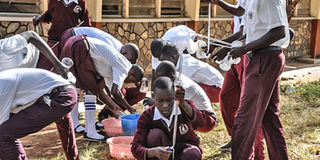Teachers disown new curriculum

Affected. Students of Moroto High School prepare for their Chemistry practice examination in 2014. photo by steven ariong
What you need to know:
Stand-off. Although they insist that they were not consulted, curriculum developers say they had meetings with university vice chancellors and head teachers.
Teachers under the Uganda National Teachers Union (Unatu) have disassociated themselves from the new lower secondary curriculum on account that they were not consulted during the drafting process.
The teachers say they do not know what is contained in the revised curriculum, which is expected to be launched by the minister of Education next month.
“We have not been consulted. We don’t know what is in the new secondary curriculum. We have not had face to face interaction with the curriculum developers. What we know is what we see in the newspapers. As you realise, our members are the ones who are going to implement it. It leaves a big gap and has far-reaching consequences,” Mr Filbert Baguma, Unatu general secretary, told Daily Monitor yesterday.
However, officials at the National Curriculum Development Centre (NCDC) insisted they consulted the teachers.
Ms Grace Baguma, the NCDC executive director, said they consulted university vice chancellors, head-teachers and some members of the teachers’ union.
“We can’t reach to all the 49,000 teachers. We have used a few of them. We have worked with some members of Unatu and head teachers’ union. How much do they want to be consulted? Head teachers are also teachers, we met vice chancellors,” Ms Baguma said.
She said half of the curriculum writers were teachers, adding that out of the 18 panellists, nine were practising teachers.
The new curriculum has reduced teaching subjects at O-Level from 43 to 21.
The curriculum developers say the subject content has been reduced by getting rid of the obsolete knowledge and integrating related knowledge based on relevance, societal needs and national goals.
Other changes that have been included in the new curriculum is recognition and assessment of students’ everyday achievements at school both in and outside class during their four-year education cycle.
The scores in these performances will contribute 20 per cent of the student’s overall final grade in Senior Four national examinations, which will account for 80 per cent of the marks.
Under the new curriculum, school time will start at 8:30am and close at 4:30pm, but class time stops at 2:50pm and the learners will spend the remaining one hour and 40 minutes doing extra-curricular activities and self-discovery before retiring home.
A school will teach 12 subjects at Senior One and Two, out of which 11 will be compulsory while one will be from an elective menu (optional).
Students at levels Three and Four, will exit (sit national examinations) with a minimum of eight subjects or a maximum of nine with seven of them compulsory.
Chinese has been added to the teaching menu of foreign languages while Kiswahili, Physical Education and Entrepreneurship will be compulsory for all learners in Senior One and Two.
Cross cutting issues such as climate change, patriotism, human rights, peace, gender and HIV/Aids have been integrated into the various subjects. ICT will be used as an instructional tool for learning and also as a subject.


